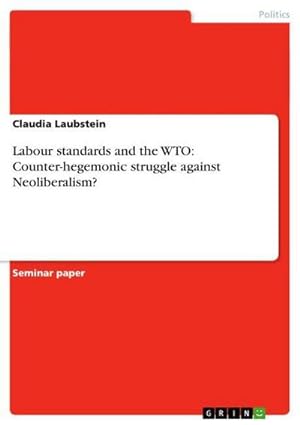LAUBSTEIN, CLAUDIA (1 Ergebnisse)
Produktart
- Alle Produktarten
- Bücher (1)
- Magazine & Zeitschriften
- Comics
- Noten
- Kunst, Grafik & Poster
- Fotografien
- Karten
-
Manuskripte &
Papierantiquitäten
Zustand
- Alle
- Neu
- Antiquarisch/Gebraucht
Einband
- alle Einbände
- Hardcover
- Softcover
Weitere Eigenschaften
- Erstausgabe
- Signiert
- Schutzumschlag
- Angebotsfoto
Land des Verkäufers
Verkäuferbewertung
-
Labour standards and the WTO: Counter-hegemonic struggle against Neoliberalism?
Verlag: GRIN Verlag, 2007
ISBN 10: 3638739007ISBN 13: 9783638739009
Anbieter: AHA-BUCH GmbH, Einbeck, Deutschland
Buch
Taschenbuch. Zustand: Neu. Druck auf Anfrage Neuware - Printed after ordering - Seminar paper from the year 2004 in the subject Politics - International Politics - Topic: Globalization, Political Economics, grade: 1,3 (A), Johannes Gutenberg University Mainz (Political Science), course: International Financial Institutions: Friend or Foe , language: English, abstract: This paper tries to determine causes for the only limited impact of labor movement. First, I will outline the neo-Gramscian approach to International Political Economy with its central concepts of hegemony and counter-hegemony. From a neo-Gramscian perspective, the labor movement is regarded as a counterhegemonic project which tries to change the hegemonic institution WTO to its advantage. I will show that the need for a social clause arose from tensions within the neoliberal order. In the analysis, the focus will be on the thesis that the labor movement itself is too divided and therefore does not represent a uniform strategy which would be necessary for the building of counter-hegemony. More particularly, a deep division runs between North and South. I will set up the thesis that the perception of an antagonism between Northern and Southern interests is further fueled by nationalist populist movements in developed countries, which themselves have their origins the neoliberal mode of production. The Singapore Ministerial Conference of the WTO in 1996 is the background for discussion because the introduction of labor issues rejected then and further attempts to revive the debate have not led to other results yet1. The dominance of neoliberalism and the social forces of capital will be overviewed in short because they benefit from the current absence of labor standards and therefore oppose the counter-hegemonic movement. The results will be summarized in the conclusion chapter.


